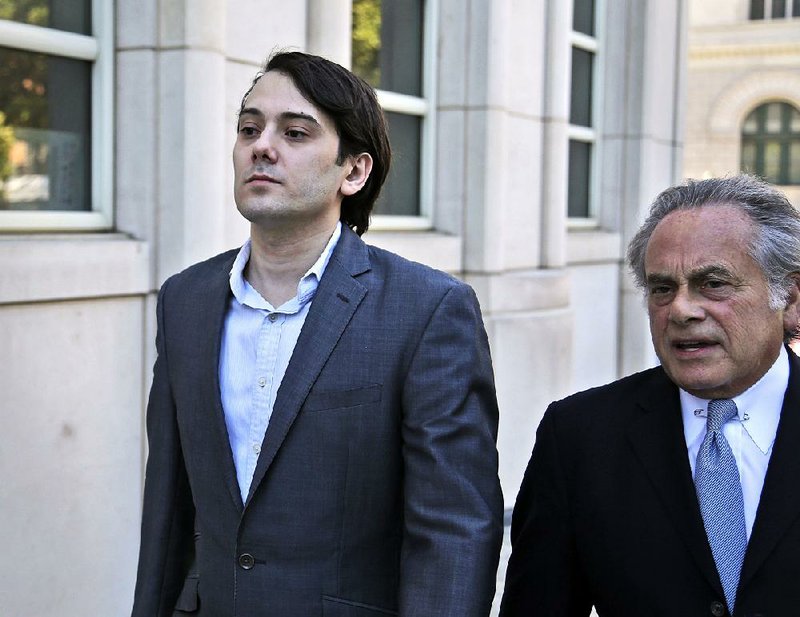NEW YORK -- Conflicting portraits of Martin Shkreli were offered Wednesday during opening statements in the ex-pharmaceutical CEO's securities fraud trial.
"Is he strange? Yes," defense attorney Benjamin Brafman told the jurors in federal court in Brooklyn. "Will you find him weird? Yes. But Martin Shkreli, despite all his flaws and dysfunctional personality, is brilliant beyond words."
In his opening statement, Assistant U.S. Attorney Karthik Srinivasan accused Shkreli of building a bogus hedge fund empire by telling "lies on top of lies on top of lies." Though he portrayed himself as a Wall Street wizard, "in reality, he was just a con man," the prosecutor said.
Shkreli faces eight charges including wire fraud, securities fraud and conspiracy and faces up to 20 years in prison.
The defendant, who often slumped in his chair and looked bored during jury selection, listened intently and took notes during the government's opening. As his lawyer spoke, he beamed at times.
Shkreli, 34, gained attention in 2015 after a drug company he founded, Turing Pharmaceuticals, spent $55 million for the U.S. rights to sell a life-saving medicine called Daraprim and promptly raised the price from $13.50 to $750 per pill.
The spotlight intensified later that year with his arrest on charges -- unrelated to Daraprim -- focusing on a pair of failed hedge funds he founded.
Federal prosecutors alleged that for five years Shkreli lied to investors in two hedge funds and the biopharmaceutical company Retrophin, all of which he founded. After losing money on stock bets he made through one hedge fund, prosecutors said, Shkreli started another and used his new investors' money to pay off those who had lost money on the first fund. Then, as pressure was building, Shkreli started Retrophin, which was publicly traded, and used cash and stock from that company to settle with other investors, prosecutors contend.
Srinivasan said Shkreli secretly looted Retrophin for $10 million to pay back his disgruntled clients.
"Rather than owning up to his lies and admitting his investments were a failure, the defendant doubled down by engaging in an even bigger fraud," Srinivasan said.
Brafman said the alleged victims in the case were high-rolling investors who were drawn to Shkreli's quirky personality and ended up getting their money back -- and more -- because Retrophin eventually became a successful startup worth $1 billion.
Board members of his companies who made fun of Shkreli behind his back -- questioning his sexuality, wondering if he was autistic and calling him "Rain Man" after the movie character -- misunderstood his talents, said the lawyer, who himself referred to his client as a "nerd," "odd duck" and a "mad scientist."
He added: "As Lady GaGa said, he was 'Born This Way.'"
Jury selection, which started Monday, dragged out until late Wednesday afternoon as the judge sought to find jurors who could ignore the negative press over the price-gouging scandal. More than 250 potential jurors were interviewed Monday and Tuesday, but not a single one was seated.
Packed into the second-floor courtroom in Brooklyn this week, several potential jurors said they had already formed strong opinions of Shkreli. One potential juror told U.S. District Judge Kiyo Matsumoto that Shkreli is "the price gouger of drugs. My kids are on some of these drugs."
Another said, "I know he's the most hated man in America," while another asserted that "from everything I've read, I believe the defendant is the face of corporate greed in America." All were excused from the jury.
Also hard to ignore was Shkreli's footprint on social media, where he boasted about buying a one-of-a-kind Wu-Tang Clan album for $2 million and got kicked off of Twitter for his interactions with a female freelance journalist.
With news trucks stationed outside and more than a dozen reporters flowing in and out of the courtroom, Shkreli is facing intense media scrutiny. Citing negative news coverage of his client, Shkreli's attorney on Tuesday requested a mistrial, which was denied. He also asked that reporters not be allowed to listen to potential jurors voice their opinions about Shkreli, which was also denied.
Court officers confiscated from one of the potential jurors a copy of one of the New York tabloids that covered the first day of the trial. "I think it's impossible for jurors not to see them. I have someone who is facing 20 years in prison," Brafman said earlier this week.
The trial is scheduled to last from four to six weeks, and Matsumoto told potential jurors that it "promises to be interesting and educational."
Information for this article was contributed by Tom Hays of The Associated Press and Renae Merle of The Washington Post.
Business on 06/29/2017

